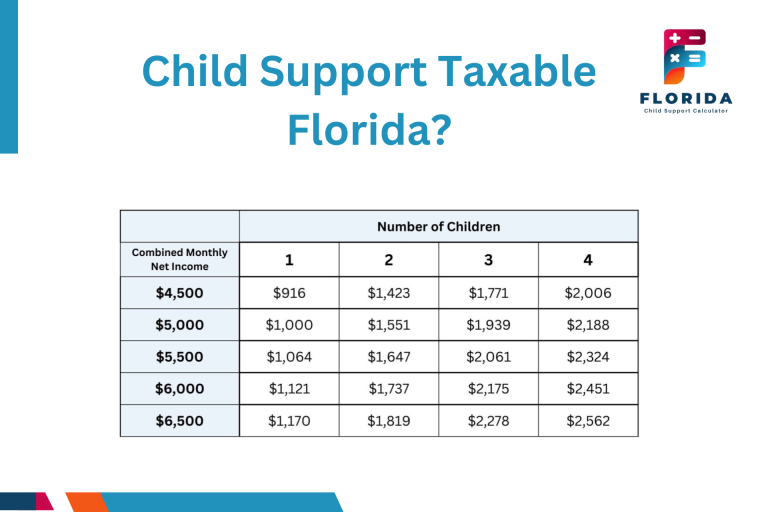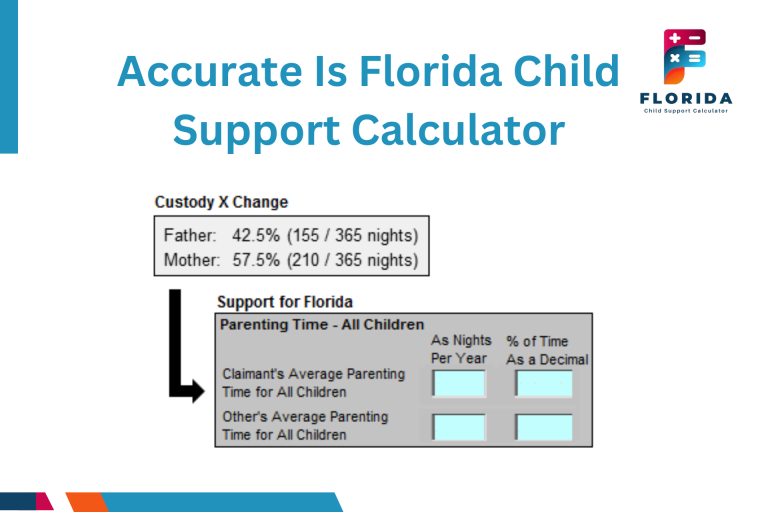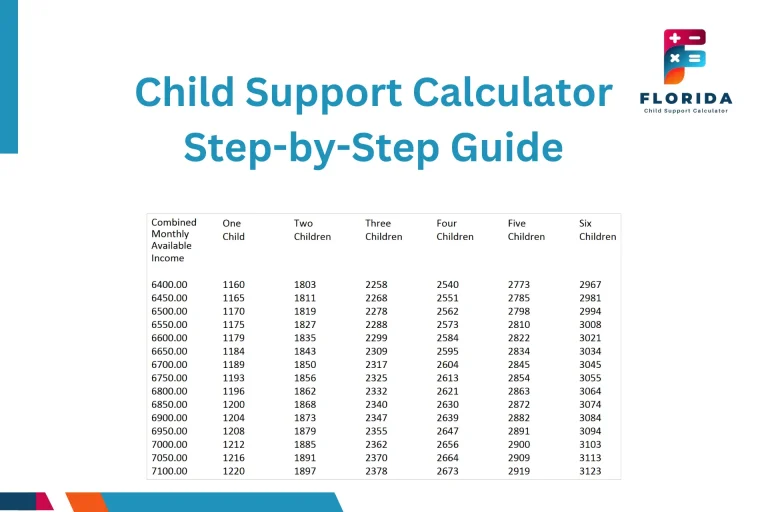What Is the Minimum Child Support in Florida?
What is the minimum child support in Florida? It’s a question many parents ask the moment child support comes up, and no, it’s not the same for everyone. Whether you’re earning a little, in between jobs, or just trying to plan, knowing the lowest possible child support you might pay (or receive) can save you from surprise bills later.

Florida uses the Income Shares Model, and even if you make minimum wage, there’s often a baseline amount expected. We’ll also talk about how things like health care costs and job status change the rules. Ready to figure out how the numbers really work? Let’s break it down in plain English.
What is the Minimum Child Support in Florida?
When people hear the word “minimum,” they often think of something really small, like pocket change. But when it comes to child support in Florida, even the smallest amount can make a big difference for your child. The court sets a base amount, and it depends on your income, parenting time, and other things.
What Is the Lowest Amount of Child Support You Can Pay in Florida?
If you’re earning very little or are even unemployed, you might still need to pay some child support. Florida courts usually don’t go below $50 per month, unless you get SSI or have a serious medical issue. That’s because child support is meant to help with basic needs, even a small amount helps.
At very low incomes (around $800/month combined), the Florida Child Support Guidelines show that the lowest support amount is about $74/month for one child. And yes, even if you’re between jobs, the court may still count what you could earn. This is called imputed income, and it keeps support fair.
Still unsure how much you may need to pay? Use our Florida Child Support Calculator to see what fits your situation.
How is Child Support Calculated in Florida?
Florida doesn’t guess when deciding child support, it uses math. The state follows a legal formula to figure out how much each parent should pay, based on how much money both of you make. This is called the Income Shares Model, and it’s built to keep things fair.
What Florida Statute 61.30 Says About Minimum Payments
The rules come straight from Florida Statute 61.30, which gives a full chart for different income levels. Courts use this chart to decide payments based on combined income, number of children, and parenting time.
If you and the other parent make around $1,000/month together, and you have one child, your support could be around $100/month. Other factors also affect this, like whether one of you pays for health insurance or daycare.
Florida’s Child Support Income Shares Model
Here’s how the model works: Florida adds up both parents’ income, then splits the child costs based on how much each earns. It’s kind of like sharing a pizza, you pay for the slices based on how many you ate. If you earn 60% of the money, you’ll pay about 60% of the child support.
This approach is explained in detail on our page about Florida child support calculation factors. And if you’re wondering how time-sharing affects this, shared custody can reduce the amount one parent pays.
What to Include as Income When Calculating Support
Many people think only their job counts. But Florida’s courts count almost everything as income. That includes your paycheck, of course, but also side jobs, bonuses, and even money from renting out a room. It’s all added up to keep the support fair.
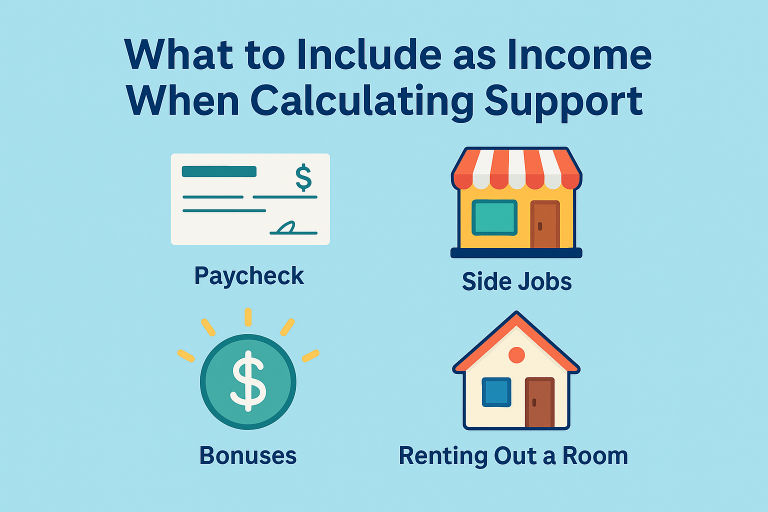
How Florida Courts Handle Different Types of Income
Don’t forget that even if you drive for Uber on weekends or sell things online, that income is counted. Florida courts look at gross income, not just your 9-to-5 job. This includes tips, commissions, alimony from a previous marriage, or even disability benefits.
We break this down step-by-step in our guide on what income is used for child support in Florida. And if you’re still not sure, the Florida Child Support Calculator lets you plug in the numbers to get a quick answer.
Why Imputed Income Matters
Even if you’re not working now, the court might still guess how much you should be making. That’s called imputed income, and it can come from your last job, your education, or what people in your town usually make doing similar work.
For example, if you used to make $500/week as a delivery driver, the court may assume you can still earn that and base support on it. More on this is covered under how Florida calculates income in tough situations.
How Florida Child Support Affects Health Care and Childcare Costs
When the court sets child support, it doesn’t just count food and clothes. Health care and childcare also play a big part. These costs are added to the base amount, making the support higher or lower depending on the situation.
How Health Care Costs Are Included in Child Support
Florida courts want both parents to help with health insurance and medical bills. If one parent pays for insurance, that cost is added to the support total. For example, if you cover your child’s $150 monthly health plan, that gets factored in.
This is clearly shown in our breakdown of how Florida child support affects health care costs. Even things like braces or emergency room visits can be split based on income shares.
If you’re not sure how this works in your case, the Florida child support calculator can show how insurance and medical expenses change the final number.
Total Childcare Costs Also Affect What You Pay
Let’s say your child goes to daycare or preschool, those costs count too. Florida adds childcare expenses to the monthly child support amount, especially if the parent works full-time.
These extra costs can make support go up fast. That’s why our page on total childcare costs and child support in Florida explains how the court splits them fairly.
And when you’re entering numbers into the child support calculator, don’t forget to include babysitting or after-school care.
Deviations from Minimum Child Support in Florida
Sometimes, the court doesn’t follow the usual chart. That’s called a “deviation.” It means the judge changes the amount based on things like equal custody, high medical bills, or a child’s special needs. These are rare but important.
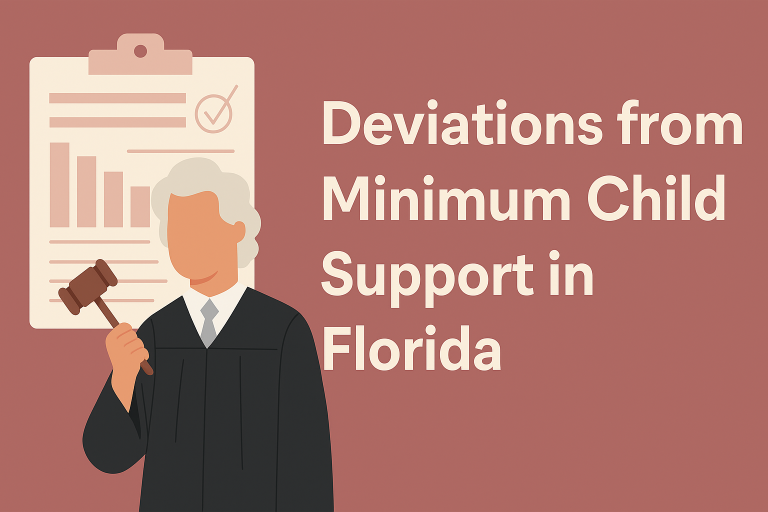
When Does the Court Decide to Deviate?
Courts can deviate from Florida’s guidelines when the normal amount doesn’t fit the family’s life. For example, if you have 50/50 custody and both parents make similar money, support may be reduced or not required at all.
You’ll find these details in our page about child support calculation adjustments, which also covers rare cases like children with special healthcare needs or gifted student expenses.
Other common reasons for deviation include long-distance parenting, unusual travel expenses, or supporting kids from other relationships.
What Happens in High-Income or Very Low-Income Cases?
If a parent makes a lot more than the other, the court might adjust the support amount up or down. In very low-income cases, the court might lower the amount to avoid hardship, but this doesn’t mean skipping support entirely.
Sometimes, people ask if the minimum child support in Florida can go under $50. The answer? Rarely. But a judge can allow it if there’s strong proof of financial trouble.
For those making six figures, deviations can also happen to cover luxury schooling or activities like music lessons, and those changes are covered in more detail under child support calculation rules.
Can the Minimum Child Support in Florida Be Waived?
A lot of parents wonder if they can skip paying child support. The short answer? Usually no. But there are some rare times when the court says it’s okay to waive it. These need clear proof and legal approval.
Waivers for Parents Receiving SSI or Living on Disability
Florida law allows support waivers for parents who only get Supplemental Security Income (SSI). If you’re disabled and can’t work, and SSI is your only income, the court might set your payment at $0.
These waivers are explained under special cases like SSI-only situations, where the court puts the child’s needs first, but also respects your limits.
Still, even if payments stop, your case might stay open. And support could return if your income changes.
Can You Waive Support in Shared Custody?
Even when both parents have equal time with the child, that doesn’t always mean child support is canceled. If incomes are very different, the court might still order one parent to pay.
The rules for this are shared in our article on shared parents’ work for child and income balance. The goal is always to keep the child’s life steady, not to punish either parent.
Some parents even agree on a no-payment plan, but remember: only a judge can approve it. Otherwise, it doesn’t count legally.
Can the Minimum Child Support in Florida Be Modified Later?
Life changes jobs come and go, expenses rise, and incomes fall. That’s why Florida courts allow parents to ask for a change in their child support amount if something big happens.
How to Request a Modification of Child Support in Florida
To lower or increase child support, you need to show that something important has changed. Maybe you lost your job, had another child, or your ex is now making a lot more money.
We explain the full process in our article on modifying child support in Florida. Courts look for real changes, not just “I want to pay less.” You’ll need proof, like pay stubs, bills, or medical records.
Also, don’t wait too long. Support doesn’t automatically change until the court agrees. Use this calculator tool to estimate your new payment before filing.
What Triggers a Legal Modification Request?
Florida law requires a change of at least 15% or $50/month in the support amount for the court to consider a modification. That could mean a job loss, an increase in expenses, or a major change in custody time.
We go over these triggers clearly in the section on Florida child support adjustment rules. Even small changes like daycare costs or income tax shifts can tip the balance.
If both parents agree on the new amount, that’s great. But remember, the court still has to approve it officially.
What Happens If You Don’t Pay Even the Minimum?
Child support isn’t optional. If you skip payments, Florida doesn’t just sit back. The state can take serious steps to make sure the child still gets what they need.
Child Support Enforcement in Florida
The Florida Department of Revenue tracks child support payments closely. If you’re behind, they can garnish your wages, take your tax refunds, or even suspend your driver’s license.
You can read real examples in our post on what happens if you don’t pay child support guidelines in Florida. Some parents even face jail time if they ignore court orders for too long.
Still, if you’re struggling, don’t hide. Asking for a modification is better than falling into debt or losing your rights.
License Suspension and Wage Garnishment
Florida uses powerful tools to collect unpaid child support. They can freeze your bank account, hold your paycheck, or stop you from renewing a passport or license. These actions happen fast, sometimes after just a few months of missed payments.
Details about these steps are in our article on child support enforcement actions, where we explain how to avoid these problems and stay in good standing.
If you’re stuck and can’t pay, update your income info using this support calculator page to plan your next move.
Accruing Arrears and Credit Reporting
Unpaid child support becomes arrears, a debt that keeps growing. Florida can report this to credit agencies, which can hurt your ability to rent a home, get a car, or even find a job.
We’ve included examples on our page about legal actions and jail for unpaid child support. Remember: interest may also add up on this debt, and there’s no forgiveness unless the court says so.
The best way to avoid arrears is to stay updated, use the calculator to track your payment, and talk to the court if anything changes.
Florida Minimum Child Support FAQs (2025)
There are a lot of “what if” questions when it comes to child support in Florida. Let’s answer some of the most common ones in plain language so you can stop wondering and start planning.
Is There a Grace Period Before Payments Begin?
Usually not. In most cases, the court orders support to begin right away, starting from the day of the hearing or court filing.
But sometimes, if the other parent delays filing paperwork, support might not start until later. You can check how start dates affect amounts on our Florida child support timeline page.
How Are Minimums Calculated If Both Parents Work?
If both of you earn money, the court adds your incomes together and splits child support based on your share of the total. So if you make 60% of the total, you’ll likely pay 60% of the costs.
We cover these calculations fully in our post on Florida’s child support laws and rules. The income shares model keeps things balanced and fair.
What If There’s a New Child or Family Situation?
If you have another child from a new relationship, the court may adjust your support amount, but not always. You’ll need to file for a change and explain how your income is now split.
That scenario is one of the reasons people file for modification. But remember: a new baby doesn’t automatically reduce your current support unless the court agrees.
Conclusion
Let’s be real, child support isn’t just a number on paper. It’s a way to keep your child’s life stable, no matter what’s happening with work, money, or living situations. Even if you’re earning the minimum, Florida usually expects some level of support.
Here’s a quick recap of what matters:
- The minimum child support in Florida is usually around $50–$74/month, depending on income and the number of kids.
- Health care and childcare costs are added on top of base support.
- Support can be changed if life throws a curveball, but only through the court.
- If you don’t pay, Florida enforcement laws kick in fast, and arrears grow quickly.
- Use our Florida Child Support Calculator to stay ahead of what you owe or expect to receive.
If you’re not sure where you stand, start by reviewing how child support is calculated, checking your income, and breathing. You’re doing this for your child, and they’re worth every penny.


